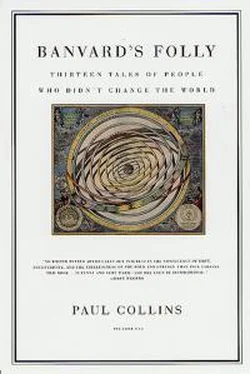Sudre spent the rest of the summer shuttling back and forth between London and Paris; the size of his audience is hinted at by the fact that his London venue was the concert hall of King's Theatre. His six dictionaries were put on display in Paris, and another commission hastily convened to issue yet another glowing report of Sudre's latest invention. By the end of the summer, Sudre had sketched out two more dictionaries, and he was now including Solresol translations of Dutch and Swedish in his shows.
But he could not linger in Paris, for he had received word that his presence was required in England: the King and Queen wished to meet him.
It was well that Sudre and his pupils had labored so long onstage before his command performance, for they were now seasoned linguistic performers. He first gave a polished demonstration in York to the archbishop, the Duchess of Kent, and a certain Princess Victoria--a young woman who would just two years later assume the throne.
He then traveled down to the royal retreat at Brighton, where George IV had once built a gaudy and carnivalesque Chinese pavilion for royal entertainment.
Sudre and his students filed across the marble floors into a salon crammed with lacquered furniture, dragon chandeliers, and sumptuous red curtains and bowed to King William and Queen Adelaide. As bridge tables were brought in for the royals to write upon, Sudre introduced himself with a slight nervous tremor in his voice. The Queen quickly put him at ease: on the slip of paper that she passed to him for translation she had written "I wish you success."
From there, the rest of his demonstration went without a hitch.
After this triumph, Sudre spent part of 1836 compiling favorable government reports and press notices, including his own translations from the British press, into a compendium titled Rapports sur la Langue Musicale. Sudre stuffed in every article he could lay his hands on, even ones that were direct plagiarisms of others. He took this book on the road across France and in tours over the next several years in Belgium and the Netherlands.
But Sudre had more up his cape. Over the following years he developed an extraordinary array of ways of expressing Solresol. You could do it through numbers (1 equals do, 2 equals re, etc.), which could also be expressed as a series of knocks or other sharp sounds. You could talk through visual hand signals and through the seven ROYGBIV colors of the spectrum. With each passing year, Sudre worked obsessively on further improvements-telegraphic versions of Solresol, stenographic symbols, written shorthand, and the like.
He did not expect Solresol ever to replace national languages, but he desperately wished to see it become the second language to which every human would be born into.
It is hard to imagine anyone wanting to live in such a vertiginous world of hidden meanings. Awareness of Solresol can be disorienting and a little unnerving in a chaotic world that does not actually follow its strictures; one modern Solresolist, Greg Baker, recalls that after a while he started wondering how "the beginning of Beethoven's Fifth seems to talk about
"Wednesday."" Needless to say, obsessive fans who hear already secret messages in music would not do their mental stability any favors by learning Solresol.
And yet the experience may be less cacaphonic than we might imagine. In practice, Solresol is a language in the key of C. Imagine sitting down at a
piano and only hitting the white keys randomly. Or, better yet, raid your child's room and plonk away on a kiddie xylophone or toy piano. No matter how hard you try to foul it up, you'll still sound pretty good. This is why virtually every nursery rhyme is written in this key. An instrument tuned to C
can give performances that aren't very structured or melodic, but they'll also never sound harsh or dissonant--and the same can be said for Solresol.
The French language, on the other hand, is a fine instrument for sour notes.
Not everyone was enchanted by Sudre. He began receiving nagging letters in 1839 from Aimè Paris, a scholar who became his bitterest critic. In 1821, Paris had tried to create a universal language himself, an attempt that ended with his throwing his notes in the fire. Later Paris attended Sudre's lectures and glowered at the unscientific nature of Sudre's crowd-pleasing proofs: it was, he spat, "a juggling act" put on by a "mountebank."
His hostility reached a peak in the winter of 1846, when he published a newspaper article denouncing Sudre as a fraud. A planned second attack was scrapped, probably by editors who feared a libel suit. But Paris, undeterred, went on to publish two tracts in 1846 and then 1847 containing both his articles and the broadsides fired back and forth through the mail between himself and Sudre.
In his first attack, he concedes that Sudre's T@el@ephonie system might have some limited usefulness, but then heaps scorn on the "so-called Universal Musical Language." Paris was enraged that prominent commissions were giving Sudre their approval, when--or so Paris thought--all Sudre had created was a childish set of "detestable" conversions from one alphabet to another; this, he claimed, hardly constituted a language:
Who would believe, after so many celebrated people have given their seal of approval, that we weren't looking at one of these important discoveries that change the face of the world, and decide the fate of nations? And yet I regret to say that these Institute members have been deceived by Monsieur Sudre ....
[they] gave him the stamp of a great man simply because he discovered the French language minus its orthography.
Paris goes on to charge Sudre with trying to rip off the government through his continued publicity stunts and begging for grants. He ridicules Sudre's claim of having spent decades developing the language, and even gets up a certain swagger in his attacks against Sudre's requests for a government pilot program: "Sudre has asked for two years to set up such a system at great expense. I could do it in six weeks for free."
Perhaps, Paris insinuated, he wouldn't even need six weeks, because musical language had all been done before anyway by Blaise de Vigenere in his 1587
cryptographic treatise Traitè des Chiffres, out Secr@etes Mani@eres d'@ecrire, and by Gustavus Selenus in his 1624 work Cryptomenytices et Cryptographiae. Indeed, we can only imagine Sudre's chagrin when in 1830, just one year after he had begun his efforts on Solresol, B. E. A. Weyrich published in Leipzig a slim fifty-page tract on a musical language, Die Instrumentalton-Sprechkunst. To Sudre's great good luck, though, Weyrich's rather simplistic proposal quickly sank out of view. But by rehashing these ideas so incompetently, Paris charged, Sudre had poisoned the well for any genuine innovators:
After all these frauds have created a public prejudice against them, it takes many men to get a real new idea to be accepted .... The Universal Musical Language's nature, usefulness, and power are all illusions. Sudre has destroyed its potential usefulness by his deceits. His work should be rejected
as an illusion and a lie .... So many great plans languish in obscurity, while puerile, trendy inventions become all the rage. If only geniuses knew how to scheme.
Paris's many charges against Sudre don't bear much scrutiny. His disdain for Sudre's publicity methods may be justified, but that hardly takes away from Sudre's language. The claim that musical languages had been invented before is true but irrelevant--nobody had worked out a vocabulary and grammar to the extent that Sudre had. And the charge that Sudre had falsely claimed years of labor on Solresol was effectively disproved by the eventual publication of a Solresol dictionary and lexicon.
Sudre was bewildered by Paris's vehement attacks. "I don't know why Aimè Paris has ridiculed my invention," he shrugged. "He thinks he has the last word on it. He hasn't even had the first word." It may have been simple envy.
Читать дальше











